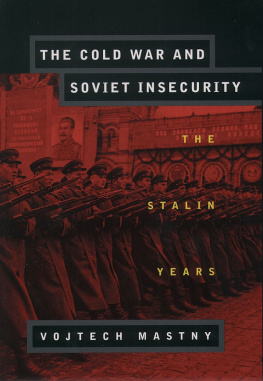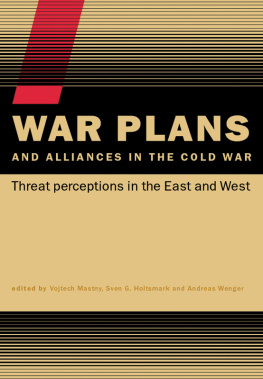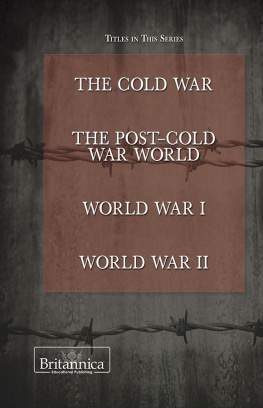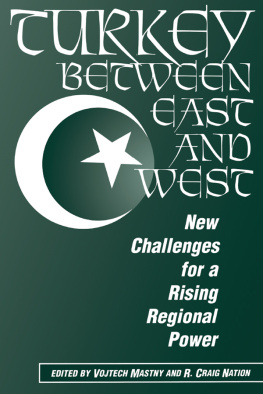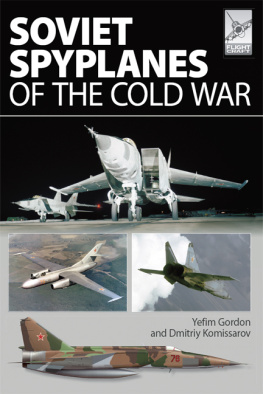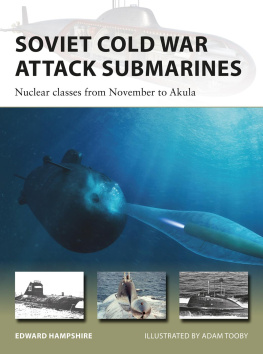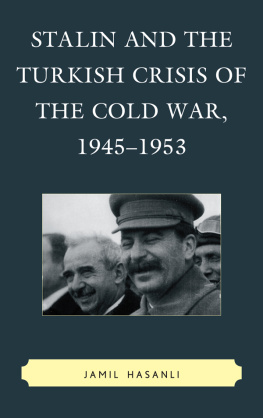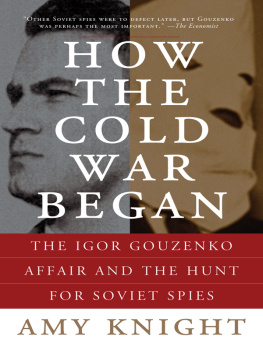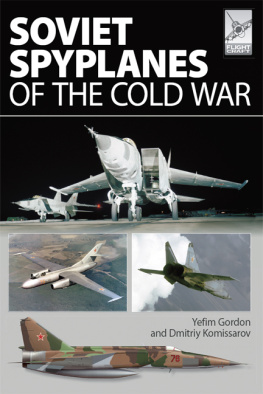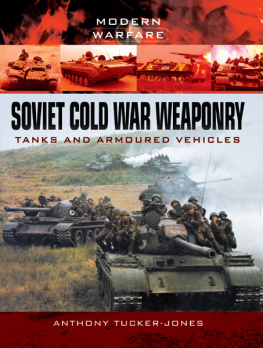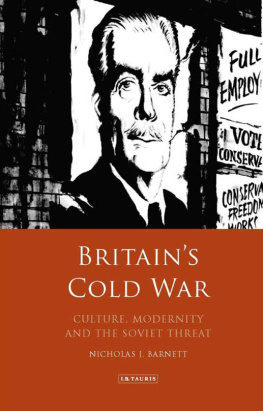Mastny - The Cold War and Soviet Insecurity
Here you can read online Mastny - The Cold War and Soviet Insecurity full text of the book (entire story) in english for free. Download pdf and epub, get meaning, cover and reviews about this ebook. year: 2015, publisher: Oxford University Press, Incorporated, genre: Detective and thriller. Description of the work, (preface) as well as reviews are available. Best literature library LitArk.com created for fans of good reading and offers a wide selection of genres:
Romance novel
Science fiction
Adventure
Detective
Science
History
Home and family
Prose
Art
Politics
Computer
Non-fiction
Religion
Business
Children
Humor
Choose a favorite category and find really read worthwhile books. Enjoy immersion in the world of imagination, feel the emotions of the characters or learn something new for yourself, make an fascinating discovery.
- Book:The Cold War and Soviet Insecurity
- Author:
- Publisher:Oxford University Press, Incorporated
- Genre:
- Year:2015
- Rating:5 / 5
- Favourites:Add to favourites
- Your mark:
- 100
- 1
- 2
- 3
- 4
- 5
The Cold War and Soviet Insecurity: summary, description and annotation
We offer to read an annotation, description, summary or preface (depends on what the author of the book "The Cold War and Soviet Insecurity" wrote himself). If you haven't found the necessary information about the book — write in the comments, we will try to find it.
Mastny: author's other books
Who wrote The Cold War and Soviet Insecurity? Find out the surname, the name of the author of the book and a list of all author's works by series.
The Cold War and Soviet Insecurity — read online for free the complete book (whole text) full work
Below is the text of the book, divided by pages. System saving the place of the last page read, allows you to conveniently read the book "The Cold War and Soviet Insecurity" online for free, without having to search again every time where you left off. Put a bookmark, and you can go to the page where you finished reading at any time.
Font size:
Interval:
Bookmark:

VOJTECH MASTNY
New York Oxford
Oxford University Press
OxfordNew York
AthensAucklandBangkokBogotBuenosAires
CalcuttaCape TownChennaiDar es SalaamDelhi
FlorenceHon KongIstanbulKarachiKuala LumpurMadrid
MelbourneMexico CityMumbaiNairobiParisSo Paulo
SingaporeTaipeiTokyoTorontoWarsaw
and associated companies in
Berlin Ibadan
Copyright 1996 by Vojtech Mastny
First published in 1996 by Oxford University Press, Inc.
198 Madison Avenue, New York, New York 10016
First issued as an Oxford University Press paperback, 1998
Oxford is a registered trademark of Oxford University Press
All rights reserved. No part of this publication may be reproduced,
stored in a retrieval system, or transmitted, in any form or by any means,
electronic, mechanical, photocopying, recording, or otherwise,
without the prior permission of Oxford University Press.
Library of Congress Cataloging-in-Publication Data
Mastny, Vojtech, 1936
The Cold War and Soviet insecurity : the Stalin years / Vojtech Mastny.
p. cm. Includes bibliographical references and index.
ISBN 0-19-510616-4
ISBN 0-19-512659-9 (pbk.)
1. Soviet UnionPolitics and government19251953.
2. National securitySoviet Union.
I. Title.
DK267.M35671996
947.0842dc2095-49341
1 3 5 7 9 8 6 4 2
Printed in the United States of America
on acid-free paper
For Kathryn
This book has been in the making for a long time. It has given its author the extraordinary experience of having lived through the events it describes and then being able to study them from the inside evidence as Soviet and other communist archives opened their doors. The price of that experience has been much writing and rewriting, sometimes with no end in sight.
I first conceived the study of the last Stalin years as a sequel to my Russias Road to the Cold War during the Reagan years of the second Cold War. Although a Soviet-certified enemy of socialism and dtente dressed in a scholarly garb, I found it difficult to believe that the adversary could possibly be as formidable as it appeared at a distance to so many American conservatives, including some of my colleagues at Boston University, where I was teaching at that time. A desire to find out more about the sources of Soviet insecurity gave the initial impetus to my research in U.S. libraries and archives, which the universitys Center for International Relations generously supported.
In 198890 my leave of absence in Western Europe provided an exposure to different, though not necessarily more accurate, views of the Soviet Union, informed by its greater proximity. The Federal Institute for East European and International Studies in Cologne and the Netherlands Institute for Advanced Study in the Humanities and Social Sciences in Wassenaar, where I was successively a visiting fellow, offered a stimulating intellectual environment and excellent working conditions, thus allowing the project to move forward. Its progress would have been much faster if I had not been distracted by too many other worthwhile projects as the Cold War was coming to an end.
The slowdown turned out to be a benefit in disguise once the end of the confrontation as well as of the Soviet empire brought both new perspectives and new documents. At that memorable time, a Fulbright professorship at the University of Bonn, followed by an invitation to join the faculty of the Bologna Center of the Johns Hopkins University, enabled me to witness firsthand such historic events as the coming down of the Berlin Wall and the coming up of the Russian flag over the Kremlin, where it replaced the old Soviet one. Such impressions could not fail to leave an imprint on the book.
For my research in the Moscow archives, I received support from the Diplomatic Academy of the Russian Foreign Ministry, the American Association of Professional Schools of International Affairs, the Cold War International History Project, and the Bertelsmann publishing house. Aleksandr A. Gordievskii of the Russian Diplomatic Academy, Sergei Mironenko, now director of the Archives of the Russian Federation, and Leonid la. Gibianskii of the Institute of Slavic and Balkan Studies of the Russian Academy of Sciences, as well as Aleksandr Chubarian and Aleksei Filitov of its Institute of Universal History, assisted my undertaking in a variety of indispensable ways.
In Prague, my research proceeded especially thanks to Oldrich Sldek, director of the archival administration of the Czech Republic responsible for the records of the communist party central committee, and Marta Kapalnov, director of the archives and documentation division of the Foreign Ministry. In Berlin, the staff of the former archives of the East German communist party proved consistently helpful.
At the Johns Hopkins School of Advanced International Studies, Bologna Center, I benefited from a succession of dedicated and efficient research assistants from among my students: Klaus Wiegrefe, P. J. Simmons, Roger Malone, Jancsi Strohmayer, and Marc Mezey. Gail Martin was always able to get the books I needed on interlibrary loan, and Lori Cohen did a superior job editing my manuscript.
When the manuscript was nearing completion, a fellowship at the Norwegian Nobel Institute in Oslo enabled me to test my findings in discussions with its staff and guests while putting the finishing touches on my work during the spectacular Nordic summer of 1994. My thanks for that experience go especially to Geir Lundestad, Odd Arne Westad, and Anne C. Kjelling.
In the fall of 1995, I was able to do the last-minute updating of the already finished manuscript thanks to the excellent facilities of the Slavic Research Center at the University of Hokkaido, where I was spending a semester as a research fellow.
At Oxford University Press, Susan Ecklund proved a splendid copy editor, Joellyn M. Ausanka incorporated my extensive revisions with cheerful competence, and Nancy Lane managed the whole publication process with an admirable expertise.
| Sapporo, Japan December 1995 | Vojtech Mastny |
Podstrekateli [The Firebrands], Krasnaia Zvezda, February 12, 1981.
Rarely has the present receded into the past more quickly than in the years that followed the end of the Cold War. Normally, people sense a continuity; even after great wars that break it do they feel an urge to come to grips with their recent experience by relating it to their new condition. No such urge has grown out of the sudden and unexpected denouement of the East-West conflict, breeding instead the bizarre notion that history itself may have ended. Although a proliferation of crises soon exposed the fallacy of such a notion, the forty-year rivalry has continued to fade from memory. That a contest of such intensity and magnitude could safely be relegated to oblivion would seem too good to be true; even if it were so, the reasons why would all the more cry for an explanation.
This book would long have been finished if the disappearance of its protagonistthe Soviet Unionhad not intervened while the research was in progress, thus changing the perspective, though not necessarily the substance, of the argument. What used to be an open-ended development became closed, thus allowing us to see not only how the Cold War started but also how it ended. At the same time, our ability to tell what really happened and why has vastly increased. The partial opening of Russian archives and the eagerness of Soviet witnesses to testify have added the inside dimension that was previously missing. It has become possible not only to conceive of the Cold War as history but also to study it as such.
Font size:
Interval:
Bookmark:
Similar books «The Cold War and Soviet Insecurity»
Look at similar books to The Cold War and Soviet Insecurity. We have selected literature similar in name and meaning in the hope of providing readers with more options to find new, interesting, not yet read works.
Discussion, reviews of the book The Cold War and Soviet Insecurity and just readers' own opinions. Leave your comments, write what you think about the work, its meaning or the main characters. Specify what exactly you liked and what you didn't like, and why you think so.

